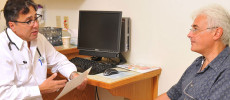
Dr. Frederic Seifer with patient at St. Lawrence Health System’s Potsdam-based pulmonology practice. Photo by Canton-Potsdam Hospital.
February is both heart disease and cancer awareness prevention month, making it especially relevant to COPD patients. According to the Mayo Clinic, individuals with chronic obstructive pulmonary disease (COPD) have an increased risk of developing heart disease and lung cancer. COPD is characterized by persistent airflow limitations caused by long-term exposure to particle irritants, most often from tobacco smoke.
“COPD is a preventable and treatable disease,” said Jill Rock, AHI PPS project manager. “Seventeen percent of upstate New York residents are tobacco smokers, indicating a tremendous opportunity to use education and prevention to minimize future cases.”
AHI formed a PPS (Performing Provider System) which is a network of regional partners needed to implement the DSRIP (Delivery System Reform Incentive Payment) program in the North Country region. The goal of DSRIP is to lower the number of people admitted to hospitals for avoidable reasons by 25% over 5 years, while improving quality of care.
“Diseases and disorders of the respiratory system is the third leading cause of emergency room visits in our nine-county region,” said Rock. The AHI PPS serves Clinton, Essex, Franklin, Hamilton, Warren, and Washington counties, and portions of Fulton, Saratoga and St. Lawrence.
Dr. Frederic Seifer, a practicing pulmonologist at Canton-Potsdam Hospital, St Lawrence Health System (an AHI PPS partner) has overseen readmission rates driven down to single digits. “Recently shared data for the Medicare population 30-day readmission rate for the first three quarters of 2015 was down to 6.9%,” said Seifer. “I’ve heard this compares to 13% just a year earlier in 2014. I’m pleased we were able to influence such a robust change.”
Seifer joined the St Lawrence Health System eighteen months ago in the newly created role of Medical Director of Population Health. “I’m a pulmonologist, but my passion has been health management rather than disease management. I’ve been involved in what is now called population health for 15 years.”
Dr. Seifer’s Canton-Potsdam success was due to managing systemic change in the following ways:
- Change requires a coalition of interest – leadership champions and vision are requirements. “There was a capital investment, but importantly there was a philosophical commitment from leadership. At Canton-Potsdam, we had the full support of David Acker, the president and CEO.”
- Give everyone a chance to get on board. “Our treatment procedure became an ACO/system wide practice because the ACO leadership was 100% behind it. Dr. Greg Healey and Joel Duhl arranged for me to share a didactic training on how to recognize and treat COPD with all ACO physicians.”
- Know you can inspire others. “We’re collecting data and tracking what works with the goal to establish St. Lawrence Health System as a leader in population health both statewide and nationally.”
Accurate Assessment
With staff and physicians on board, the next step to making any difference is to have an accurate assessment of your patients. “Across the nation, we’re missing 40% of COPD cases. To address this gap, we believe in investing in a COPD- PS (population screener) rather than clinical assessment. To date, close to 2,000 screens have led to pulmonary function testing and identified patients in our system with COPD who have not been previously diagnosed,” said Seifer.
The next step is to remove the patients misdiagnosed with COPD. Additionally, a disease that is correctly diagnostically identified leads to correct treatment. “Once we have an accurate COPD patient pool, then we can take the correct steps for appropriate treatment,” Seifer stated.
Mutual accountability
“Population health comes down to access – paired with mutual accountability. Can’t have one without the other. Patient engagement is fundamental to success. I ask patients to participate in their care and to contact me when they are feeling a little bit sick, as opposed to waiting for a full blown crisis. With that ‘I’m feeling a little bit sick’ phone call, the patient has prevented a hospital visit. While access is important, I feel that it’s more important to explain to the patient their responsibility to their health. I’ll provide them my cell number, but I’m not going to chase them. By empowering them, patients step up to the plate.”
“Thirty-six organizations are partnering on the AHI PPS COPD project,” said Rock. “Adopting evidence-based guidelines along the lines of Dr. Seifer’s success is of paramount importance to this group.”


